| Fun house mirrors are amusing for a short time. Like caricatures they emphasize some features while diminishing others – or making them completely disappear. But the reason they’re enjoyable is because you know what the true image looks like, and you’re only seeing the distortion for a short time for amusement. And everyone looking at the distortion knows it’s a distortion. That’s why you stand before the distorting mirrors in the first place – to be amused by how the mirror will distort your features.
But how would you feel if all that people knew about you was the distorted image? What if they never saw the real you, the undistorted you? What if all your life you had to deal with people thinking that you were in fact the distortion they saw? |
Contents
|
Category Archives: Jesus The Messiah
Knowledge of the Holy One Part 1: Jesus – the Holy One Revealed
“Who do you say I am?”
This is one of the most well-known questions Jesus asked his disciples. Perhaps because it is arguably the most significant. Significant not just for his disciples, but for everyone – because at some point everyone must answer that question.
Amid the cacophony of false idols, false religions, false gods, false ideas, hearsay and slander against Jesus everyone must answer the question Jesus puts to them: “Who do you say I am?” (Matt 16.15) It was no different for the disciples or the people of Jesus’ day. Consider the context in which Jesus asks his disciples the question: Having just fed more than 4,000 people, Jesus was approached by the unbelieving and treacherous Pharisees and Sadducees who came “and tested him by asking him to show them a sign from heaven.” (Matt 16.1) So right off the bat there’s a clear indication that they would not have believed any sign he gave them because he had just performed a miraculous sign. No, they weren’t looking for reasons to believe. They were looking for reasons to justify unbelief, and put him on trial so they could sentence him to death. Continue Reading
This Easter, don’t miss the Big Picture
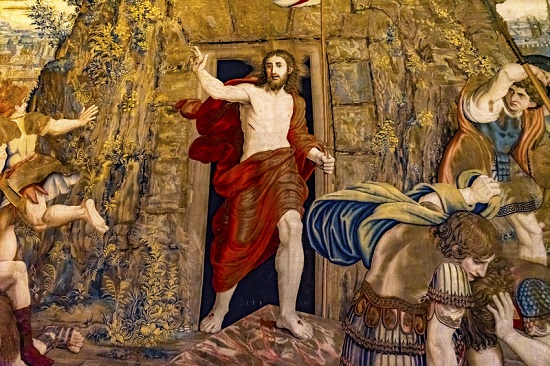
Tapestry depicting the resurrection hanging in the Vatican Museum
A Resurrection Day Meditation
Those who passed by hurled insults at him, shaking their heads and saying, “You who are going to destroy the temple and build it in three days, save yourself! Come down from the cross, if you are the Son of God!”
Matt 27.39-40
As I came to this passage while meditating on the passion narrative two things came to mind – a question and a conclusion. The question: If Jesus did come down from the cross, would those who hurled insults and mocked him have believed he was in fact the Son of God? The conclusion: No, most if not all who mocked would not have believed. The reason: there’s a recurring theme in scripture that talks about the spiritual blindness of people. It’s described as having eyes to see, but not seeing.[1] I’ll paraphrase it as missing the big picture.
Mockers at the Cross Miss the Big Picture
With the exception of the centurion who realized by his manner of death that Jesus was the Son of God (Mark 15.39), those at the cross who hurled insults were no doubt oblivious to the truth of Jesus’ identity and the many spiritual dynamics going on at the cross: That Jesus, the Son of God was, making atonement for the whole world (John 3.16) by dying in our stead on the cross. (1 Pe 3.18) And though Jesus could have commanded he be taken off the cross by angels (Matt 26.53); as Jesus had already pointed out to his disciples, if he did that, how would the scriptures be fulfilled that say it must happen this way (Matt 26.54) – with his death on a cross? Continue Reading
Is the Bible full of fantastic creatures? Part 7: Zombies
Of all the items in the list below, this one is not only foolishly laughable, but also very offensive to me as a Christian. Zombies are, of course the antithesis of what the Bible teaches about the fullness and beauty of the life to come that’s offered to all in Christ. Before we get into it, let me remind you of the list of fantastic creatures we’ve been reviewing:
“He follows a holy book with a jealous & genocidal god, ghosts, zombies, seers, devils, demons, witches, satyrs, unicorns, talking animals, a man who lived in a fish and a 7 headed dragon.”[1]
(Not listed but also covered already: The Cockatrice)
Are there zombies in the Bible?
A good practice when dealing with questions such as these is to define your terms. That is certainly necessary in this case. So what kind of “zombie” are we talking about? My expectation is that the zombie referenced in the above tweet is the typical movie zombie. And immediately we run into a bit of a difficulty, because there are a number of types of zombies seen in the movies. There are: Continue Reading
Is the Bible full of fantastic creatures? Part 6: Talking Animals and Jonah
These two topics – talking animals and “a man who lived in a fish” more than the others really highlight how your worldview and a priori assumptions influence how you understand any text as we’ll see. Of course I had to shorten the title up a bit for this one. “A man who lived in a fish” following the series name makes for a long title. But we all know who he’s referring to: the prophet Jonah. As a reminder, here is the list of fantastic creatures this particular atheist takes issue with, with links to the ones we’ve already covered:
“He follows a holy book with a jealous & genocidal god, ghosts, zombies, seers, devils, demons, witches, satyrs, unicorns, talking animals, a man who lived in a fish and a 7 headed dragon.”[1]
(Not listed but also covered already: The Cockatrice)
Are there talking animals in the Bible?
The answer to this question invokes your worldview presuppositions. Does God exist? Does Satan exist? Are they active in the world? How you answer these questions determines whether or not you believe the following explanation. Since that is the case, though it should already be clear, let me be explicit about the worldview from which I address these questions:
Continue Reading
Star of Bethlehem – Divine Preparation for the Incarnation
A Christmas Meditation
The naiveté of those who doubt that Jesus is the messiah because they suppose that he arranged to fulfill the requirements and prophecies of the messiah himself always amuses me – particularly at this time of year when the preparations of God for the arrival of the messiah are so apparent.
It reminds me of the naiveté of the comic character Calvin, of Calvin and Hobbes – an active and curious child who with his stuffed tiger (who is alive to Calvin) always gets into amusing situations. In one instance Calvin asks his father: Continue Reading
Is the Shroud of Turin Authentic? The Unconsidered Evidence
|
Summary |
||
| In their article “Is the Shroud of Turin Authentic – or Is it a Forgery” Creation Ministries International (CMI) supports the theory that the Shroud of Turin is not the authentic burial shroud of Christ – it is a medieval forgery. This article refutes that theory, along with the main reasons CMI gives for rejecting authenticity.
This article relies primarily on the testimony of Shroud of Turin Research Project (STRP) members and other expert testimony to demonstrate there is a wealth of evidence CMI apparently did not consider before drawing their conclusions. This article is intended to inform the reader of those evidences and make available the testimony of the STRP members and other expert witnesses so that readers may judge for themselves whether CMI has reached the correct conclusion. It is the position of this article that they did not. The reader is encouraged to click on the links to view the referenced testimonies. |
Are young earth evidences needed to defend Christian Faith?
10 Young earth evidences and why they’re needed
Does the age of the earth matter to your faith? The witnessing approach known as Evangelism Explosion was known for its diagnostic questions[1], so let me take that approach and ask a few diagnostic questions. Answer yes or no to the following:
Question 1: Does the account of the creation of the universe as presented in Genesis depict literal events in a historical manner the way the gospels present the life of Jesus in a historical manner?
Question 2: Is it important to stand up for a “literal” understanding of the creation of the universe as depicted in Genesis the way we stand up for a “literal” understanding of the death and resurrection of Jesus?
Question 3: Are you as proud and willing to stand for and defend the doctrine of creation as depicted in Genesis – in 6 days – as you are to stand for and defend the resurrection of Jesus on the third day?
This Easter, Thank God For Thomas
A Resurrection Day Meditation
The Apostle Thomas has been under-appreciated and unfairly characterized as “doubting” – as we understand doubting. Rather than doubting, Thomas is better described as the ultimate realist. He doesn’t put on rose colored glasses and see an idealized world. He sees things as they are in the real world. As such he provides one of the best proofs of the resurrection recorded in the Bible. A good thing to realize as we celebrate resurrection day. Let me explain why. Continue Reading
How to Answer Every Atheist Objection to the Existence of God

This is another installment in the series on how to answer atheists – in light of the many atheist memes out there. This article is a bit of a departure – instead of looking at graphical memes we’ll look at some of the overused but fallacious arguments. And since I was looking for the toughest arguments atheists present – you may or may not find memes for these: these particular arguments from atheists don’t necessarily lend themselves to a simple graphical presentation – though some are indeed out there. Continue Reading

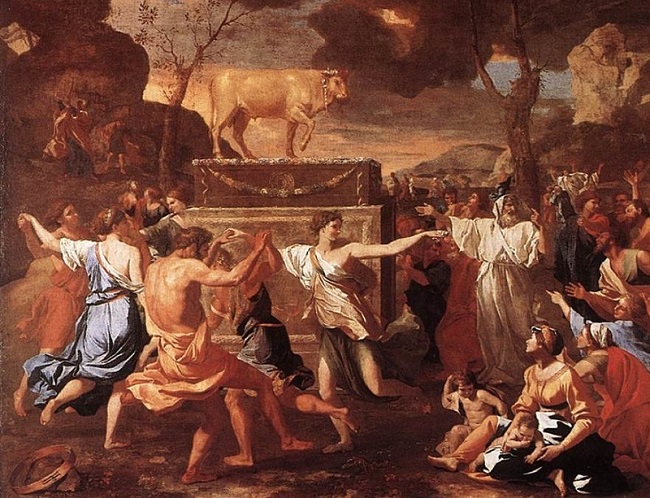
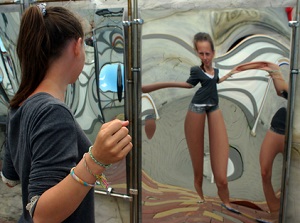
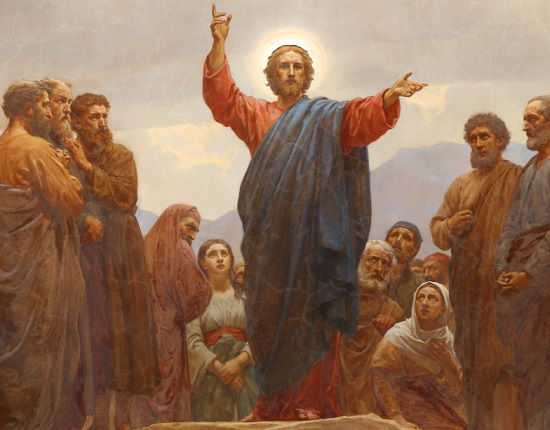
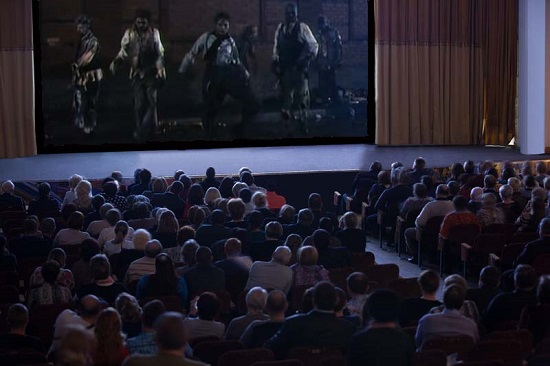




_550.jpg)